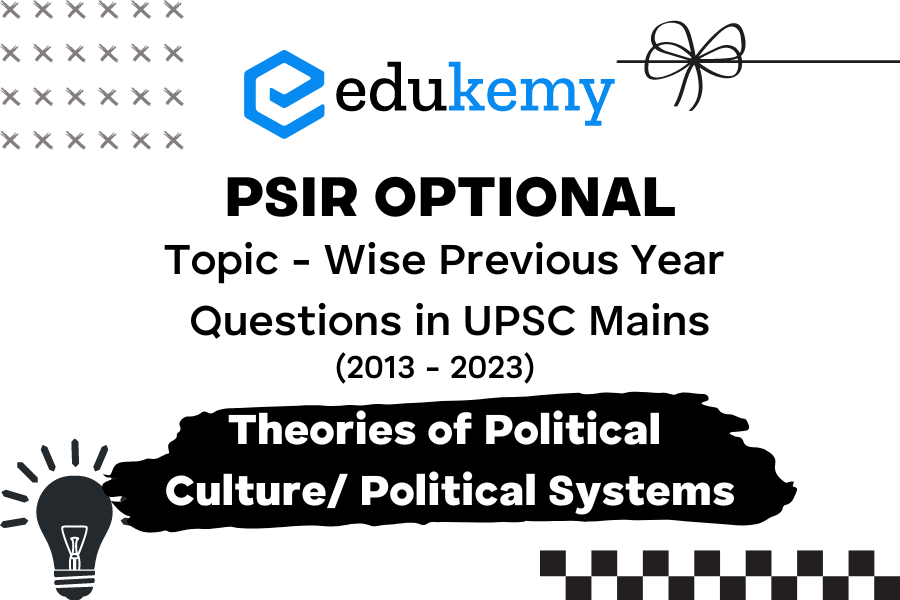
Embarking on the challenging journey of UPSC preparation demands a strategic approach, and mastering the Political Science and International Relations (PSIR) optional is a crucial component for success. In this blog series, we delve into the intricacies of the PSIR optional syllabus, focusing specifically on the Theories of Political Culture/Political Systems. The period from 2013 to 2023 has seen dynamic shifts in the way UPSC frames questions in the mains examination, making it imperative for aspirants to analyze and understand the evolution of these inquiries over the years. By exploring the PSIR optional topic-wise previous year questions, we aim to provide a comprehensive guide for candidates to navigate the nuances of this crucial subject and enhance their preparation strategy.
The Theories of Political Culture/Political Systems form a foundational segment within the PSIR optional, exploring the core principles that shape political behavior and institutions. From the impact of cultural factors on political ideologies to the study of different political systems around the globe, this topic holds immense relevance in the contemporary political landscape. By dissecting the questions asked by UPSC from 2013 to 2023, we aim to unravel the patterns, key themes, and the evolving nature of the examination. Whether you are a seasoned aspirant looking to refine your approach or a newcomer navigating the vast expanse of PSIR, this blog series serves as a valuable roadmap to enhance your understanding and mastery of Theories of Political Culture/Political Systems in the UPSC mains examination.
Contents
- 1 Theories of Political Culture/ Political Systems – Previous Year Questions (UPSC CSE Mains PSIR Optional)
- 2 Frequently Asked Questions (FAQs)
- 2.1 Q: What are the key theories in Political Culture, and how do they influence political behavior?
- 2.2 Q: How do cultural factors impact political ideologies and governance structures in different societies?
- 2.3 Q: What distinguishes various Political Systems, and how do they function on a global scale?
- 2.4 Q: How has the study of Political Systems evolved over the years, and what contemporary challenges do these systems face?
- 2.5 Q: How can a nuanced understanding of Theories of Political Culture/Political Systems enhance success in the UPSC mains examination?
- 3 In case you still have your doubts, contact us on 9811333901.
Theories of Political Culture/ Political Systems – Previous Year Questions (UPSC CSE Mains PSIR Optional)
1. Comment: Agents of political socialization. (1991)
2. Comment: Tribalism in Africa. (1994)
3. Comment: Process of Political socialization in Afro-Asian societies. (1997)
4. Write: Impact of modernisation and new communication technologies on political processes of Afro-Asian countries. (1999)
5. Do you agree with the view that Political culture of a society is highly significant aspect of the Political System? Give reasons in support of your answer. (2006)
Frequently Asked Questions (FAQs)
Q: What are the key theories in Political Culture, and how do they influence political behavior?
Understanding the major theories in Political Culture is essential for grasping the dynamics of political systems. This FAQ will delve into key concepts such as civic culture, subcultures, and political socialization, shedding light on how these theories shape individuals’ attitudes and actions in the political realm.
Q: How do cultural factors impact political ideologies and governance structures in different societies?
This question explores the intricate relationship between culture and politics. It delves into how cultural elements, such as values, traditions, and symbols, play a pivotal role in shaping political ideologies and influencing the design of governance structures across diverse societies.
Q: What distinguishes various Political Systems, and how do they function on a global scale?
This FAQ aims to demystify the complexities of different political systems, ranging from democracies and authoritarian regimes to hybrid models. It will provide insights into the functioning, strengths, and weaknesses of each system, offering aspirants a comprehensive understanding of global political diversity.
Q: How has the study of Political Systems evolved over the years, and what contemporary challenges do these systems face?
Tracking the evolution of the study of Political Systems over time, this question will explore the changing paradigms and perspectives. It will also address the modern challenges that political systems encounter, such as globalization, technological advancements, and socio-economic disparities.
Q: How can a nuanced understanding of Theories of Political Culture/Political Systems enhance success in the UPSC mains examination?
Tailored for UPSC aspirants, this FAQ provides insights into the strategic importance of mastering Theories of Political Culture/Political Systems. It discusses how a profound understanding of these concepts can empower candidates to tackle questions effectively, enabling them to excel in the UPSC mains examination.
In case you still have your doubts, contact us on 9811333901.
For UPSC Prelims Resources, Click here
For Daily Updates and Study Material:
Join our Telegram Channel – Edukemy for IAS
- 1. Learn through Videos – here
- 2. Be Exam Ready by Practicing Daily MCQs – here
- 3. Daily Newsletter – Get all your Current Affairs Covered – here
- 4. Mains Answer Writing Practice – here

